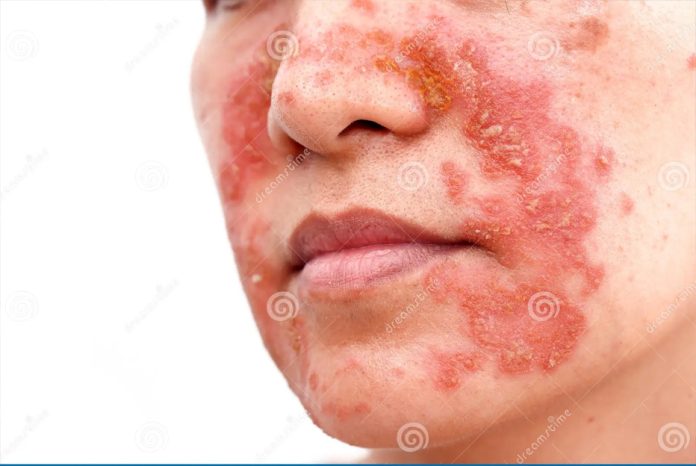Eczema is a group of skin conditions that makes your skin irritated, inflamed, and itchy. One of the common places to get a flare is on your face, especially on your cheeks. The best way to manage eczema on your face is to find out what triggers your flares and avoid contact with those triggers. But if you do have a flare, take good care of your skin by washing your face with gentle, non-soap cleanser and lukewarm water and using moisturizer several times a day.
Eczema on the Face
Eczema is a group of skin conditions that makes your skin irritated, inflamed, and itchy. Your doctor might also call it dermatitis. It weakens your skin’s barrier function, which protects you from outside elements and helps your skin retain moisture. This means that your skin may easily react to irritants and allergens in your environment.
Eczema can show up anywhere on your body, but one of the most common places is your face, especially on your forehead, cheeks, lips, and chin. You may also get it in and around your ears.
Any type of eczema can appear on your face, with atopic eczema, seborrheic dermatitis, and contact dermatitis being the most common types. And it’s possible to get more than one type of eczema at once.
Contact eczema on the face
Contact eczema (or dermatitis) happens when you come into contact with a substance that irritates your skin or triggers an allergic reaction. This type of eczema doesn’t tend to run in families and isn’t linked to other allergic conditions such as hay fever or asthma.
About 80% of the time, contact dermatitis is caused by exposure to an irritating substance, such as:
- Solvents
- Detergents and soaps
- Bleach
- Nickel-containing jewelry
- Makeup
- Hair dye
- Over-washing with hot water and soap, which can dry your skin out
However, eczema may also come from a reaction that appears a day or two after your skin is exposed to an allergen. Common causes of allergic contact dermatitis are:
- Poison ivy and poison oak
- Nail polish
- Fragrances in skin care products
- Nickel
- Thimerosal, which is a preservative found in some topical antibiotics
Symptoms of Eczema on the Face
You may get patches of eczema anywhere on your face from your chin to your forehead. But your cheeks are the most common site to get flare-ups.
Common symptoms of eczema of the face include:
- Swelling, redness, and irritation (inflammation)
- A rash with skin discoloration, which may be red, purple, or dark brown depending on your skin tone
- Itchy skin
- Dry, flaky, or scaly patches of skin
- Small bumps or blisters
- Wrinkled skin under your eyes
- Sore or uncomfortable skin
Causes of Eczema on the Face
Doctors don’t know exactly what causes eczema. But they think it’s an interplay between your genes and your environment. For instance, people who have atopic eczema often have a personal and family history of eczema, asthma, or allergies.
Factors that trigger a flare-up of eczema can be different for different people. Common triggers of eczema on the face include:
- Soaps and detergents
- Air that’s too dry or weather with low humidity
- Contact with something you’re allergic to
- Makeup
- Smoke and other pollutants
- Rough or itchy fabric, such as wool
- Emotional stress
- Eczema on Face Treatment
- Eczema can’t be cured, and it tends to come and go. The best way to treat it will often depend on what triggers your flare-ups. Your doctor will work with you to figure them out so you can avoid your triggers
- Skin Care for Facial Eczema
- One of the best ways to treat your eczema is to take good care of your skin. For instance:
- Keep your skin moisturized.Try using thick creams (such as Cetaphil or Eucerin) and ointments (such as Aquaphor or Vaseline) rather than thinner lotions. The best time to moisturize is right after you wash your face. If ointments are too greasy, try using them only at night. Also, choose moisturizers or lotions for gentle or sensitive skin. You’re looking for moisturizers that don’t have fragrances or dyes that can trigger an eczema flare.
- Clean gently. Soap can irritate your skin, but washing with water alone may not be enough, especially if your face is oily. Use a gentle non-soap cleanser or a medical emollient instead. Pat dry with a soft towel.
- Watch the temperature.Use only cool — not hot — water on your face, and for as little time as possible.
- Skip makeup. Don’t use cosmetics when you have a flare. The chemicals in makeup can irritate your skin further and prolong your flare-up.









